Un sermón de Wichita
FWCC representatives from across the Americas– from diverse contexts, perspectives, and languages– met for worship in Wichita Kansas, and listened to a message on Amos 5:18-24 offered by University Friends pastor Charity Sandstrom about the daily work of our faith, which does not change, even as the political circumstances that we find ourselves in in each of our countries do.
Mientras tanto, el domingo, representantes del CMCA de todas las Américas, de diversos contextos, perspectivas e idiomas, se reunieron para adorar en Wichita, Kansas, y escucharon un mensaje sobre Amós 5:18-24 ofrecido por la pastora de Amigos de la Universidad, Charity Sandstrom, sobre el trabajo diario de nuestra fe, que no cambia, incluso como lo hacen las circunstancias políticas en las que nos encontramos en cada uno de nuestros países.
Volunteers, Representatives and staff for FWCC Americas attended University Friends Meeting last Sunday in Wichita, KS.
Voluntarios, representantes y personal del CMCA de las Américas asistieron a la Reunión de Amigos Universitarios el domingo pasado en Wichita, KS.
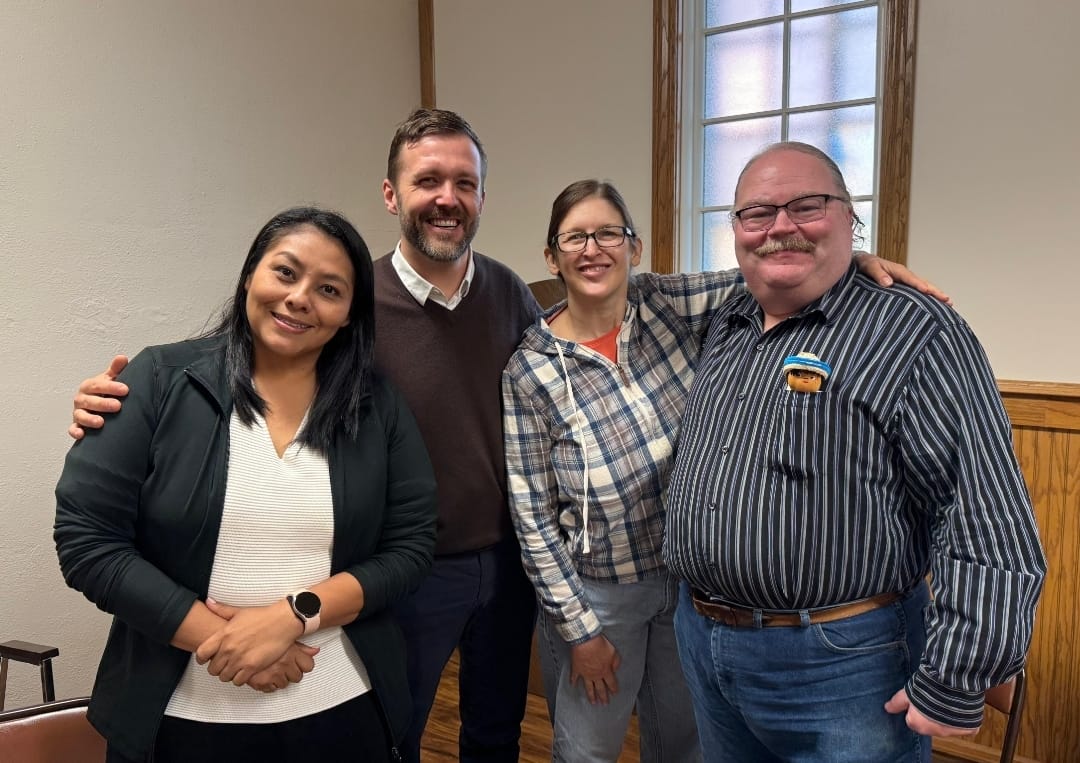
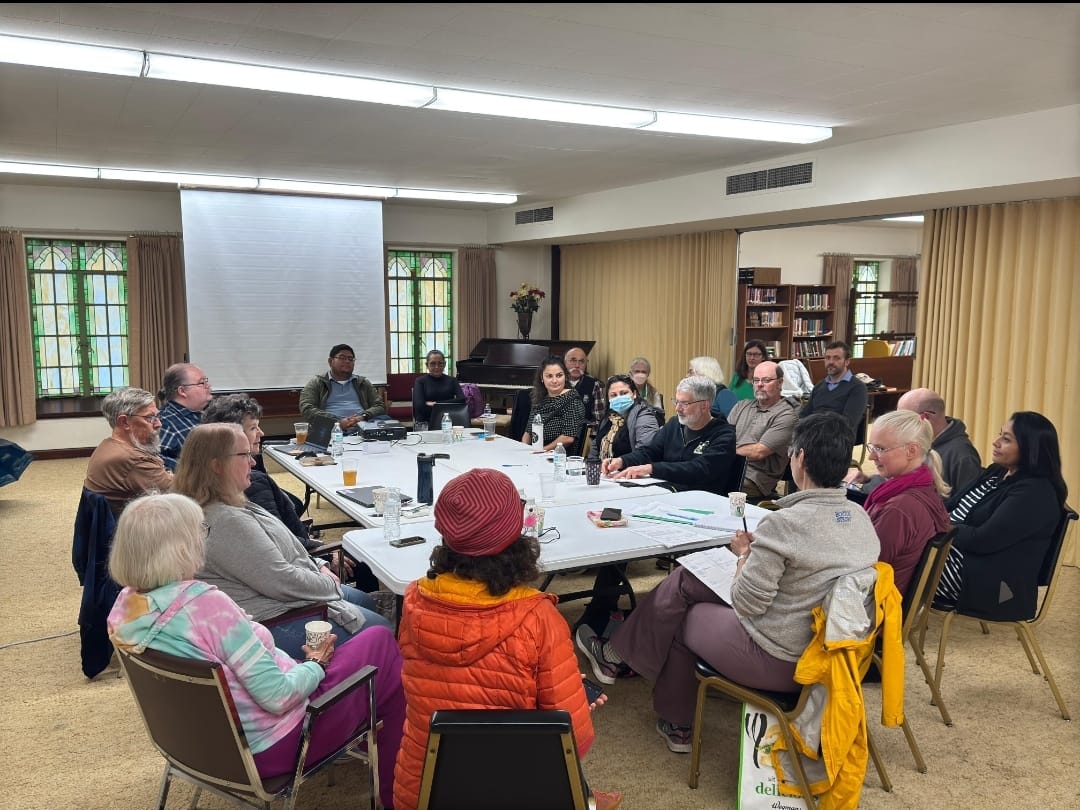
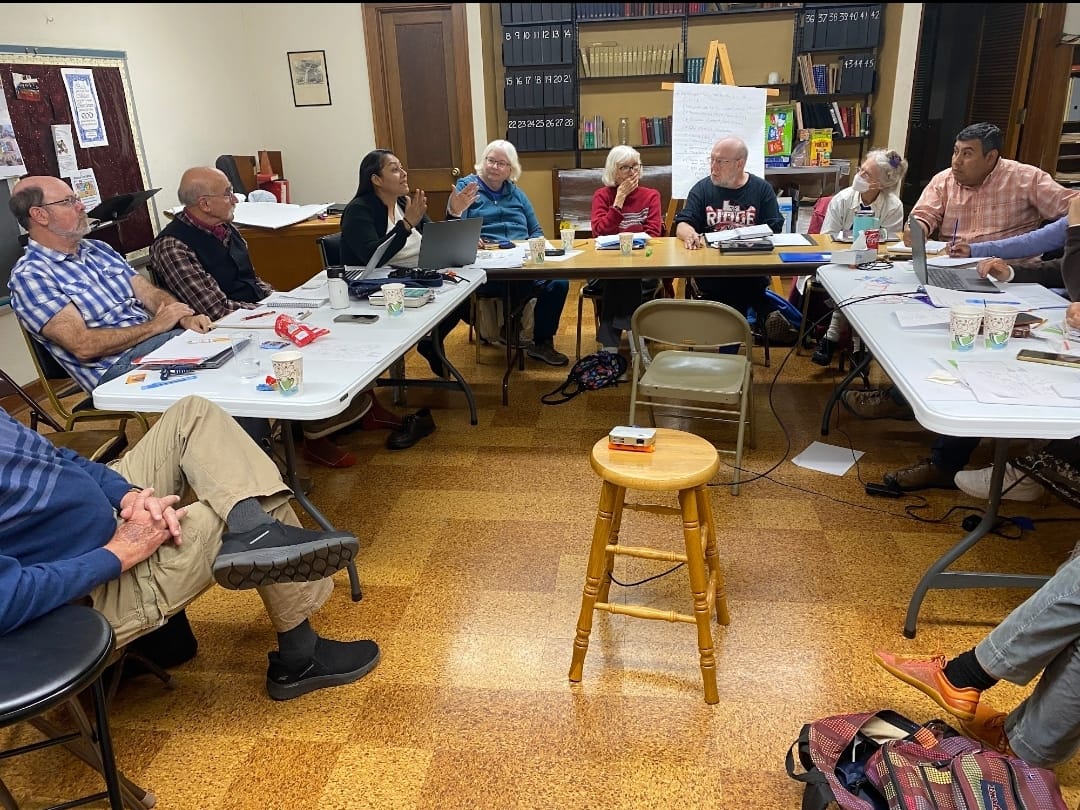
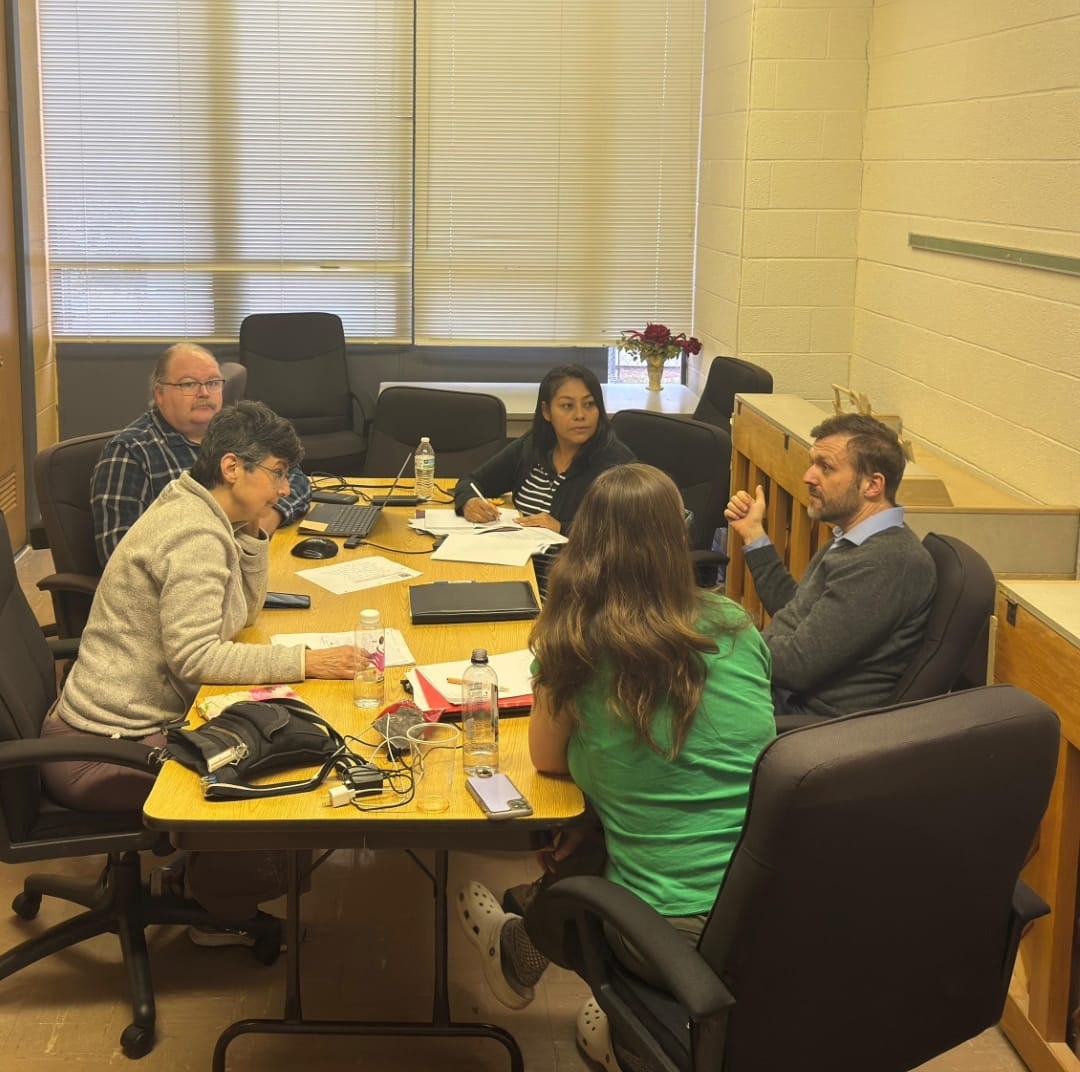
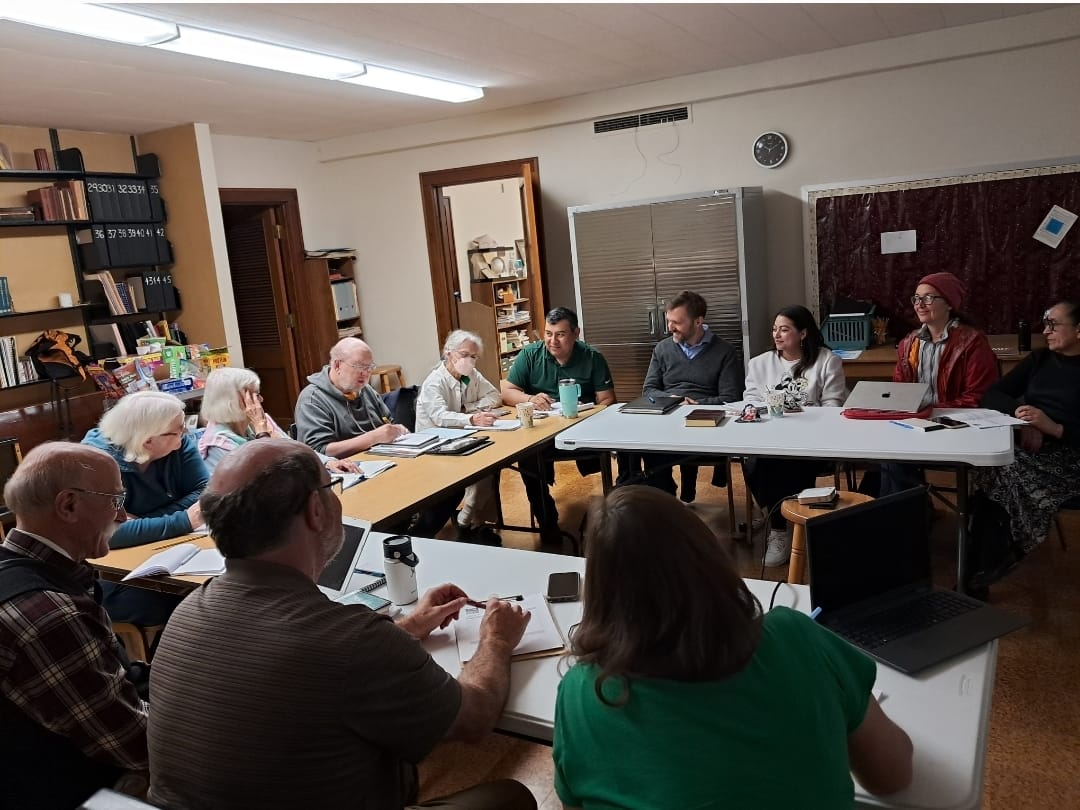
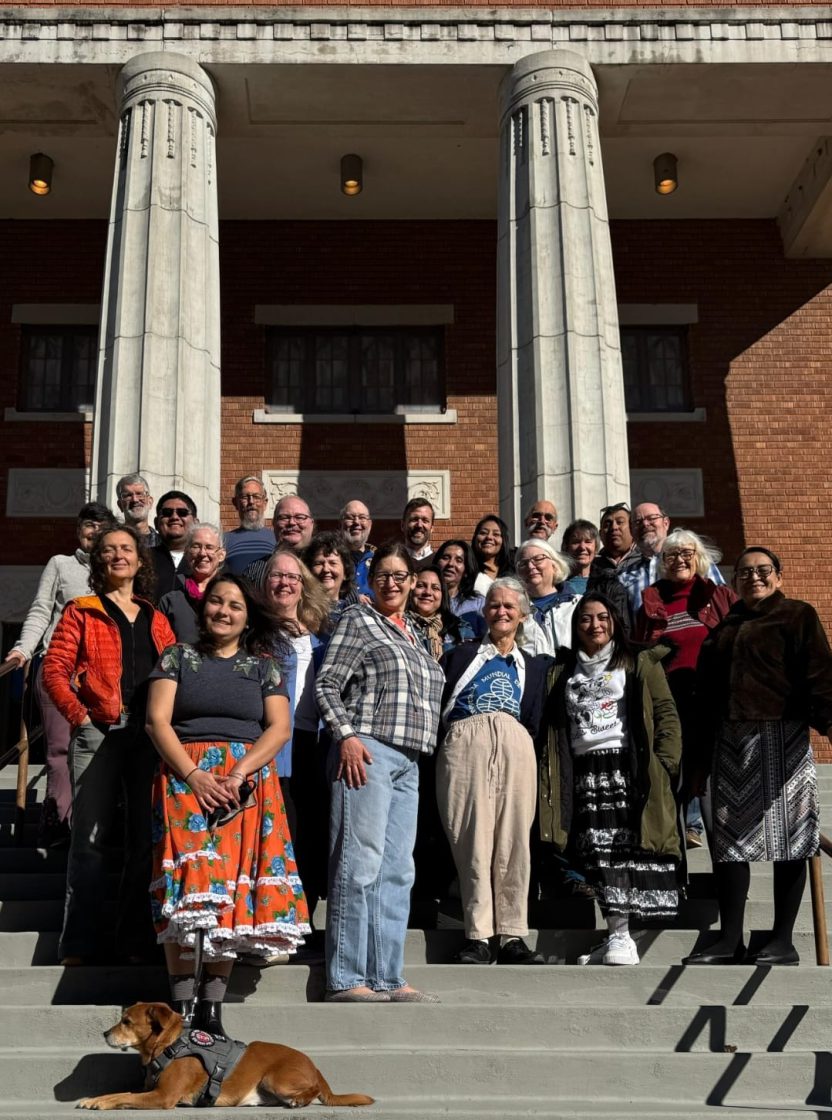
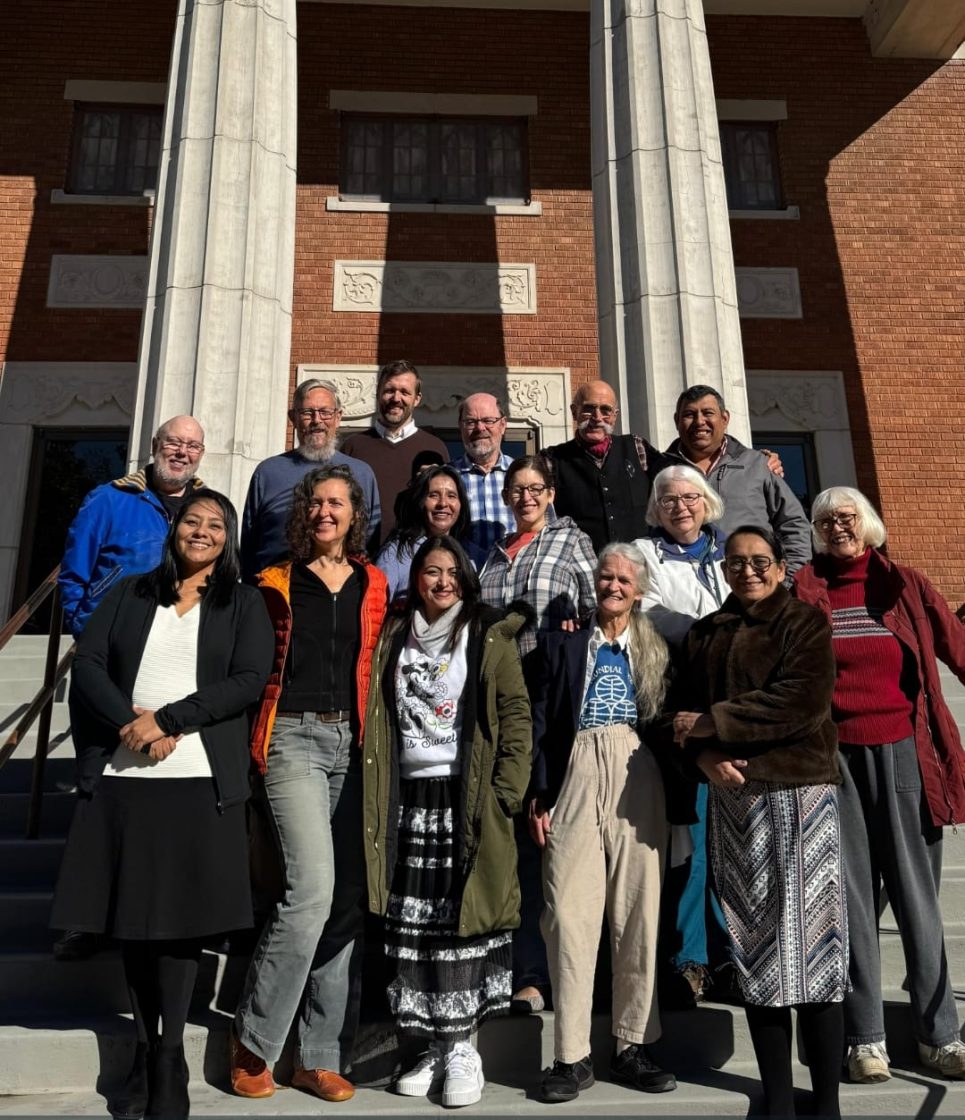
Amos 5:18-24 NRSVUE
The Day of the Lord a Dark Day
18 Woe to you who desire the day of the Lord!
Why do you want the day of the Lord?
It is darkness, not light,
19 as if someone fled from a lion
and was met by a bear
or went into the house and rested a hand against the wall
and was bitten by a snake.
20 Is not the day of the Lord darkness, not light,
and gloom with no brightness in it?
21 I hate, I despise your festivals,
and I take no delight in your solemn assemblies.
22 Even though you offer me your burnt offerings and grain offerings,
I will not accept them,
and the offerings of well-being of your fatted animals
I will not look upon.
23 Take away from me the noise of your songs;
I will not listen to the melody of your harps.
24 But let justice roll down like water
and righteousness like an ever-flowing stream.
Amós 5:18-24 Reina-Valera 1960
El día de Jehová es un día oscuro
18 ¡Ay de los que desean el día de Jehová! ¿Para qué queréis este día de Jehová? Será de tinieblas, y no de luz; 19 como el que huye de delante del león, y se encuentra con el oso; o como si entrare en casa y apoyare su mano en la pared, y le muerde una culebra. 20 ¿No será el día de Jehová tinieblas, y no luz; oscuridad, que no tiene resplandor?
21 Aborrecí, abominé vuestras solemnidades, y no me complaceré en vuestras asambleas. 22 Y si me ofreciereis vuestros holocaustos y vuestras ofrendas, no los recibiré, ni miraré a las ofrendas de paz de vuestros animales engordados. 23 Quita de mí la multitud de tus cantares, pues no escucharé las salmodias de tus instrumentos. 24 Pero corra el juicio como las aguas, y la justicia como impetuoso arroyo.
James 1:19-27 NRSVUE
Hearing and Doing the Word
19 You must understand this, my beloved brothers and sisters: let everyone be quick to listen, slow to speak, slow to anger, 20 for human anger does not produce God’s righteousness.[ justice] 21 Therefore rid yourselves of all sordidness and rank growth of wickedness, and welcome with meekness the implanted word that has the power to save your souls.
22 But be doers of the word and not merely hearers who deceive themselves. 23 For if any are hearers of the word and not doers, they are like those who look at themselves[d] in a mirror; 24 for they look at themselves and, on going away, immediately forget what they were like. 25 But those who look into the perfect law, the law of liberty, and persevere, being not hearers who forget but doers who act—they will be blessed in their doing.
26 If any think they are religious and do not bridle their tongues but deceive their hearts, their religion is worthless. 27 Religion that is pure and undefiled before God the Father is this: to care for orphans and widows in their distress and to keep oneself unstained by the world
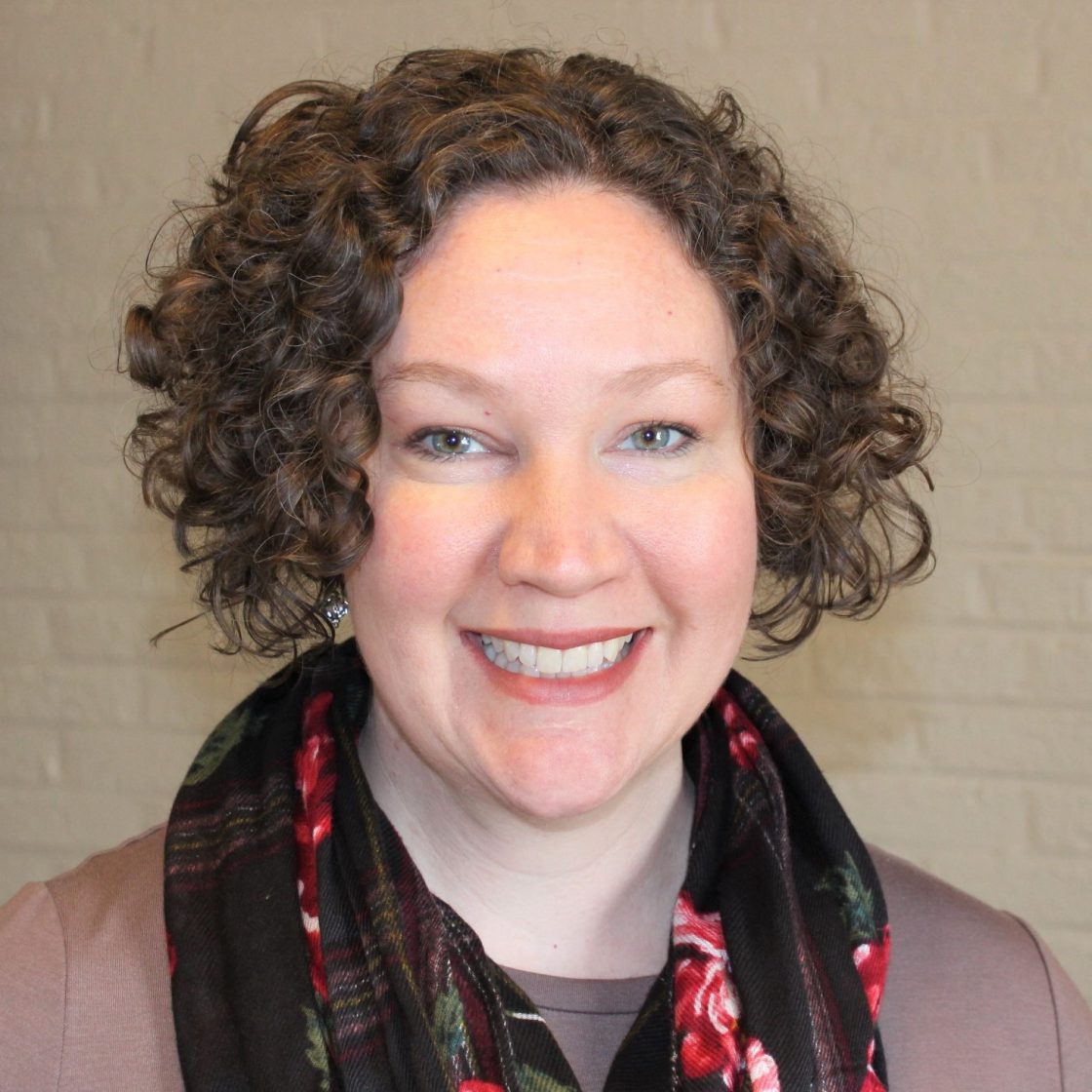
Santiago 1:19-27 Reina-Valera 1960
Hacedores de la palabra
19 Por esto, mis amados hermanos, todo hombre sea pronto para oír, tardo para hablar, tardo para airarse; 20 porque la ira del hombre no obra la justicia de Dios. 21 Por lo cual, desechando toda inmundicia y abundancia de malicia, recibid con mansedumbre la palabra implantada, la cual puede salvar vuestras almas.
22 Pero sed hacedores de la palabra, y no tan solamente oidores, engañándoos a vosotros mismos. 23 Porque si alguno es oidor de la palabra pero no hacedor de ella, este es semejante al hombre que considera en un espejo su rostro natural. 24 Porque él se considera a sí mismo, y se va, y luego olvida cómo era. 25 Mas el que mira atentamente en la perfecta ley, la de la libertad, y persevera en ella, no siendo oidor olvidadizo, sino hacedor de la obra, este será bienaventurado en lo que hace.
26 Si alguno se cree religioso entre vosotros, y no refrena su lengua, sino que engaña su corazón, la religión del tal es vana. 27 La religión pura y sin mácula delante de Dios el Padre es esta: Visitar a los huérfanos y a las viudas en sus tribulaciones, y guardarse sin mancha del mundo.
Charity Kemper Sandstrom es una autora y pastora cuáquera, que actualmente sirve en la Iglesia de los Amigos de la Universidad en Wichita, KS. Tiene tres hijos maravillosos, amor por Jesús y posiblemente una leve dependencia de la cafeína. Charity se considera una Amiga ecuménica y ocasionalmente litúrgica, apasionada por compartir el amor de Dios.
In November we are looking at four difficult themes: Grief & Remembrance, Injustice & Action, Disillusionment & Hope, Change & Growth. All of these hard things are common human experiences, and as the darkness sets in for the winter, we are holding these experiences in our hands and asking “What do we do with this hard thing?” This morning we are holding the difficult experience of injustice.
The text from Amos that was just read sets us up nicely to talk about how we usually respond to difficulty. Like children who say, “My dad can beat up your dad” in response to a perceived slight, the Children of Israel saw themselves as victims of injustice. They wanted the day of the Lord to come, so that everything could be set right. They wanted their enemies to suffer. They wanted God to sweep away evil. They were calling for it, expecting it with eager anticipation, and the prophet interrupts to say, “What in the world are you thinking? Do you really think evil is only located in your enemies?”
Why do you want the day of the Lord to come? It is darkness and not light. You hate your enemies, but do you not see the injustice that comes from your own hands? God is not interested in your festivals, rituals, and rites. Away with the noise of your worship. Instead let justice roll down like mighty waters.
It’s a good thing that was just a “them problem,” right? We certainly don’t respond the same way today, right? Oh, no, wait. I guess we are all suffering from a human problem. It is so very human to locate the source of the problem out there somewhere. We don’t want to look at ourselves, our actions. We want God to be on our side, we need it to be true. We need the certainty that I am on the right team, they are on the wrong team, and we are going to win. We will go to many lengths to convince ourselves it is true.
In this year of political strife, and we are not likely finished with the fallout of the election season, the rhetoric of “us versus them” has been intense. And the arguments presented did not serve to change anyone’s mind, rather to intensify the hate and fear of one side toward the other. In a University of London study, researchers wanted to know whether people responded primarily to factual evidence or their preexisting desire for their cause or candidate to win. What they found was that when people were presented with evidence that supported their point of view, they added that information to their sense of confidence that they would see their desired outcome. When presented with evidence that countered their point of view, they held firm to their opinion and dismissed the information. When we are engaging in “us versus them” rhetoric, it is easy to invest ourselves more heavily in being loyal to our cause than to the truth we hold dear. We set aside the values and principles God calls us to demonstrate in our lives.
The prophet Amos tells the people that their religious practices will not convince God to be on their side, only participating in creating a more just society will please God. Calling for God to bring vengeance for those who are participating in injustice will only call down judgment on their own heads if they are not careful. Not just here, but many times in the prophets, we hear that God is more interested in justice than sacrifice, more interested in a society and culture in which the poor are cared for, where the marginalized are brought to the center than one where all the rules for religious festivals are followed. Jesus picks this up in the Gospels as he told religious leaders they were more concerned with tithing their garden herbs than practicing justice and mercy. Paul tells everyone in Romans 2 that when we judge others we heap condemnation on our own heads because we do the same things.
James picks up this theme in our New Testament scripture this morning. Set aside anger. Listen instead. Human anger cannot bring about God’s justice. Remember the word in the Greek for righteousness is the same as justice. And what does James instruct us to do? He tells us to take action. Stop talking about it, and act. Stop reading about it, and act. Stop complaining about it, and act. Care for the widows, the orphans, and step away from the ways of the world.
Too often in our modern era of internet advocacy on social media, we think we have done our part if we like, share, and post the causes we care about. We think we have done our part if we go to vote once every four years. We put the responsibility of bringing about a just society on the shoulders of political and government leaders. We stop paying attention to the policies and laws that are being passed because the person we voted for won. We trust them and we don’t actually want to know if they will follow through. Or the person we voted for lost, and we give up. We decide nothing we do will matter anyway.
The reality is that justice is not lived out on the grand scale of national politics. Can we legislate changes? Yes, but unless there is agreement among everyday citizens all we do is drive injustice underground. Think with me for a minute about race relations in this country. We outlawed slavery on the national level. I agree with that decision. But what followed were 100 years of oppression in smaller laws and regulations passed at the state and local levels that imprisoned and legally re-enslaved many people of color for simply not having a job. Laws that kept black men and women from voting, even after a constitutional amendment. Laws that kept citizens of color from equal access to education, and public accommodations.
We saw activism in the middle of last century that led to desegregation of schools and other public services, the voting rights act that enfranchised voters of color for the first time in a meaningful way. I agree with these changes. But they did not end racism. Racism became subdued, expressed behind closed doors or in euphemisms and dog-whistles. People stopped saying the quiet part out loud, but they kept their biases against black people. Institutions and policies continued to disproportionately affect the daily lives of people of color. And those not directly affected could pretend that everything was ok, and racism was a thing of the past.
Why am I critiquing the practice of legislating change on a national level? I support lobbying for change on any level and through any legitimate means of making a more just society. I want the government to make good laws that lead to good lives for every person in the country. I believe good policy matters. But I believe there is something that matters more—you and I choosing justice and mercy every day.
What do we remember about the days of slavery? Quakers on the underground railroad seeking the good of their neighbor, and slave patrols hunting those seeking freedom. What do we remember about the Civil Rights movement? People on the ground either marching for peace or protesting angrily at school integration. What do you think makes more of a real difference in a neighborhood—community members who connect and care for each other, or a law that says they have to be civil?
We don’t have to wait for government policy to treat our neighbor with kindness. We don’t have to wait for the supreme court to deem goodness constitutional. We can get busy feeding the hungry or clothing the naked or visiting those who are sick or imprisoned. We can practice religion that God our Creator accepts right now. We can care for the widow and the orphan. We can let justice roll down like mighty waters and righteousness flow like a never-ending stream. We can do that regardless of who won an election. We can do that whether the ballot measure we wanted passed or not. We can choose every day to walk in step with the Spirit, love our neighbor, and lift up those in need.
We can choose to love our enemies. It is what we are called to as followers of Jesus. Love for enemy does not mean agreeing with them. It does mean seeking their good, working to create a world where they can live with respect and dignity. If we are tearing down the other side, we have already lost. Human anger does not bring about the justice of God.
That doesn’t mean you can’t be angry about injustice. It doesn’t mean you can’t tell the truth about your experiences of being mistreated. It doesn’t mean you have to bypass the negative feelings that accompany the realization that something is wrong in government or society, or your family or your neighborhood. Be upset. But take a pause. Take a moment to remember the person in front of you—even the one working injustice—is a beloved child of God. Then you can work for wholeness, healing and peace, even as you tell the hard truth and seek for systemic change.
We are all responsible for creating a community and culture of justice. We are not off the hook because of election results. We are responsible to act. And when we act in alignment with our values, with the principles of Jesus, with the working of Spirit among us, we create change from the ground up.
As we tune our hearts to listen in a time of Quaker worship, can we ask Spirit to show us the truth of our own hearts? Can we trust Christ to teach us how to live day by day in ways that add to the justice and peace of our communities? Can we allow our Creator to remind us that we are beloved Image bearers, and in that reminder accept that of God in the person before us even those who would decide we are their enemy? Let us now try what love would do.
En noviembre examinamos cuatro temas difíciles: el Dolor y el Recuerdo, la Injusticia y la Acción, la Desilusión y la Esperanza, el Cambio y el Crecimiento. Todas estas cosas difíciles son experiencias humanas comunes y, a medida que llega la oscuridad del invierno, sostenemos estas experiencias en nuestras manos y nos preguntamos: “¿Qué hacemos con esta cosa difícil?” Esta mañana contemplamos la difícil experiencia de la injusticia.
El texto de Amós que acabamos de leer nos prepara muy bien para hablar sobre cómo respondemos normalmente a cosas difíciles. Al igual que los niños que dicen: “Mi papá es más fuerte que tu papá” en respuesta a un insulto percibido, los Hijos de Israel se vieron a sí mismos como víctimas de la injusticia. Querían que llegara el día del Señor para que todo pudiera arreglarse. Querían que sus enemigos sufrieran. Querían que Dios barriera el mal. Lo estaban pidiendo, esperándolo con mucha anticipación, y el profeta interrumpe para decir: “¿En qué están pensando? ¿De verdad creen que el mal sólo se encuentra en sus enemigos?
¿Por qué quieren que llegue el día del Señor? Es oscuridad y no luz. Odian a sus enemigos, pero ¿no ven la injusticia que viene de sus propias manos? A Dios no le interesan sus fiestas, rituales y ritos. Fuera el ruido de su adoración. Más bien, corra la justicia como un arroyo fuerte.
Que bueno que fuera solo el problema de ellos, ¿verdad? Ciertamente no respondemos de la misma manera hoy, ¿verdad? Ah, no, espera un momento. Supongo que todos estamos sufriendo un problema humano. Es muy humano localizar la fuente del problema en algún lugar fuera de nosotros mismos. No queremos mirarnos a nosotros mismos, a nuestras acciones. Queremos que Dios esté de nuestro lado; necesitamos que esto sea verdad. Tenemos que estar seguros de que estamos en el equipo correcto, que ellos están en el equipo equivocado y que vamos a ganar. Haremos todo lo posible para convencernos de que esto es verdad.
En este año de lucha política, y probablemente no hemos terminado con las consecuencias de la temporada de las elecciones, la retórica de “nosotros contra ellos” ha sido intensa. Y los argumentos presentados no sirvieron para hacer cambiar de opinión a nadie, sino más bien para intensificar el odio y el miedo de un lado hacia el otro. En un estudio de la Universidad de Londres, los investigadores querían saber si las personas responden principalmente a la evidencia de los hechos o a su deseo preexistente de que su causa o candidato gane. Descubrieron que cuando a las personas se les presentaba evidencia que respaldaba su punto de vista, agregaron esa información a su sensación de confianza de que iban a ver el resultado que querían. Cuando se les presentaba evidencia contraria a su punto de vista, se mantuvieron firmes en su opinión e ignoraron la información. Cuando nos involucramos en la retórica de “nosotros contra ellos”, es fácil involucrarnos más en ser leales a nuestra causa que a la verdad que amamos. Dejamos de lado los valores y principios que Dios nos llama a demostrar en nuestras vidas.
El profeta Amós le dice al pueblo que sus prácticas religiosas no convencerán a Dios de estar de su lado, sólo participar en la creación de una sociedad más justa agradará a Dios. Los que piden a Dios que traiga venganza para aquellos que participan en la injusticia sólo hará que Dios los juzgue a ellos si no tienen cuidado. No sólo aquí, sino muchas veces en los profetas, escuchamos que Dios está más interesado en la justicia que en el sacrificio, más interesado en una sociedad y una cultura en la que los pobres sean atendidos, donde los marginados sean puestos en el centro, que en una sociedad donde todos siguen las reglas para las fiestas religiosas. Jesús retoma este tema en los Evangelios cuando les dice a los líderes religiosos que están más preocupados por diezmar las hierbas de su huerta que por practicar la justicia y la misericordia. Pablo les dice a todos en Romanos 2 que cuando juzgamos a otros acumulamos condenación sobre nuestras propias cabezas porque hacemos las mismas cosas.
Santiago retoma este tema en nuestra escritura del Nuevo Testamento esta mañana. Dejen a un lado la ira. En vez de esto, escuchen. La ira humana no lleva a cabo la justicia de Dios. Recuerden que la palabra griega para rectitud es la misma palabra que justicia. ¿Y qué nos ordena Santiago que hagamos? Nos dice que actuemos. Dejan de hablar de eso y actúen. Dejen de leer sobre esto y actúen. Dejan de quejarse y actúen. Cuiden a las viudas, a los huérfanos y aléjense de los caminos del mundo.
Con demasiada frecuencia, en nuestra era moderna de activismo en Internet por las redes sociales, pensamos que hemos hecho nuestra parte si le damos me gusta, compartimos y publicamos las causas que nos interesan. Creemos que hemos hecho nuestra parte si vamos a votar una vez cada cuatro años. Ponemos la responsabilidad de lograr una sociedad justa sobre los hombros de los líderes políticos y del gobierno. Dejamos de prestar atención a las políticas y leyes que se aprueban porque ganó la persona por la que votamos. Confiamos en ellos y en realidad no queremos saber si cumplirán con sus promesas. O, la persona por la que votamos perdió y dejamos de luchar. Decidimos que nada de lo que hagamos importará de todos modos.
La realidad es que la justicia no se vive a gran escala en la política nacional. ¿Podemos realizar cambios por medio de las leyes? Sí, pero a menos que haya un acuerdo entre el pueblo, lo único que conseguimos es ocultar la injusticia. Piensen conmigo un momento en las relaciones raciales en este país. Prohibimos la esclavitud a nivel nacional. Estoy de acuerdo con esa decisión. Pero lo que siguió fueron 100 años de opresión en leyes y regulaciones menores aprobadas a nivel estatal y local que encarcelaron y volvieron a esclavizar legalmente a muchas personas de color simplemente por no tener un trabajo. Leyes que impidieron que los hombres y mujeres negros votaran, incluso después de una enmienda a la constitución. Leyes que impedían que los ciudadanos de color tuvieran igualdad de acceso a la educación, servicios y negocios.
Vimos un activismo a mediados del siglo pasado que resultó en la eliminación de la segregación en las escuelas y otros servicios públicos, la ley de derecho al voto que otorgó derechos electorales a los votantes negros por primera vez de manera significativa. Estoy de acuerdo con estos cambios. Pero no acabaron con el racismo. El racismo se volvió más moderado, expresado a puerta cerrada o con eufemismos. La gente dejó de decir la parte prejuiciosa en voz alta, pero mantuvo sus prejuicios contra los negros. Las instituciones y políticas continuaron afectando de manera desproporcionada la vida cotidiana de las personas de color. Y aquellos que no estaban directamente afectados podían pretender que todo estaba bien y que el racismo era cosa del pasado.
¿Por qué critico la práctica de legislar el cambio a nivel nacional? Apoyo el activismo para lograr cambios en la ley en cualquier nivel y a través de cualquier medio legítimo para lograr una sociedad más justa. Quiero que el gobierno desarrolle buenas leyes que apoyen una buena vida para todas las personas en el país. Creo que las buenas políticas importan. Pero creo que hay algo que importa más: ustedes y yo eligiendo la justicia y la misericordia todos los días.
¿Qué recordamos de los días de la esclavitud? Cuáqueros en el ferrocarril subterráneo apoyando el bien del prójimo y guardias persiguiendo a esclavos que habían escapado buscando la libertad. ¿Qué recordamos del movimiento por los derechos civiles? La gente del pueblo marchando por la paz o protestando con enojo contra la integración escolar. ¿Qué creen que haga una mayor diferencia en su barrio: los miembros de la comunidad que se conectan y se preocupan unos por otros, o una ley que dice que tenemos que comportarnos bien?
No tenemos que esperar a una ley para tratar a nuestro prójimo con amabilidad. No tenemos que esperar a que la Corte Suprema determine que la bondad es constitucional. Podemos ocuparnos de alimentar a los hambrientos, vestir a los desnudos o visitar a los enfermos o encarcelados. Podemos practicar la religión que Dios nuestro Creador acepta ahora mismo. Podemos cuidar de la viuda y del huérfano. Podemos dejar que la justicia corra como aguas poderosas y la rectitud fluya como una corriente interminable. Podemos hacerlo independientemente de quién ganó las elecciones. Podemos hacerlo independientemente de que la mayoría votaron a favor del referéndum que queríamos. Podemos elegir cada día caminar junto con el Espíritu, amar a nuestro prójimo y ayudar a los necesitados.
Podemos elegir amar a nuestros enemigos. Es a lo que estamos llamados como seguidores de Jesús. Amar al enemigo no significa estar de acuerdo con él. Significa buscar su bien, trabajar para crear un mundo donde pueda vivir con respeto y dignidad. Si estamos derribando el otro lado, ya hemos perdido. La ira humana no lleva a cabo la justicia de Dios.
Eso no significa que no puedan enojarse por la injusticia. No significa que no puedan decir la verdad sobre sus experiencias de maltrato. No significa que tengan que pasar por alto los sentimientos negativos que acompañan al hecho de darse cuenta de que algo anda mal en el gobierno, la sociedad, en su familia o su barrio. Indígnense. Pero hagan una pausa. Tómense un momento para recordar que la persona que tienen delante (incluso la persona que apoya la injusticia) es un hijo amado de Dios. Recordando esto, podrán trabajar por la integridad, la sanación y la paz, incluso mientras publican la dura verdad y buscan un cambio sistémico.
Todos somos responsables de crear una comunidad y una cultura de justicia. No estamos exentos de responsabilidad por los resultados electorales. Somos responsables de actuar. Y cuando actuamos conforme a nuestros valores, a los principios de Jesús, y a la obra del Espíritu entre nosotros, creamos un cambio desde cero.
¿Podemos pedirle al Espíritu que nos muestre la verdad de nuestros propios corazones al preparar nuestros corazones para escuchar durante un periodo de adoración Cuáquera? ¿Podemos confiar en que Cristo nos enseñará cómo vivir día a día de maneras que contribuyan a la justicia y la paz de nuestras comunidades? ¿Podemos permitir que nuestro Creador nos recuerde que somos amados portadores de la Imagen y, en ese recordatorio, aceptar aquello de Dios en la persona que tenemos ante nosotros, incluso aquellos que decidan que nosotros somos su enemigo? Probemos lo que el amor es capaz de hacer.
